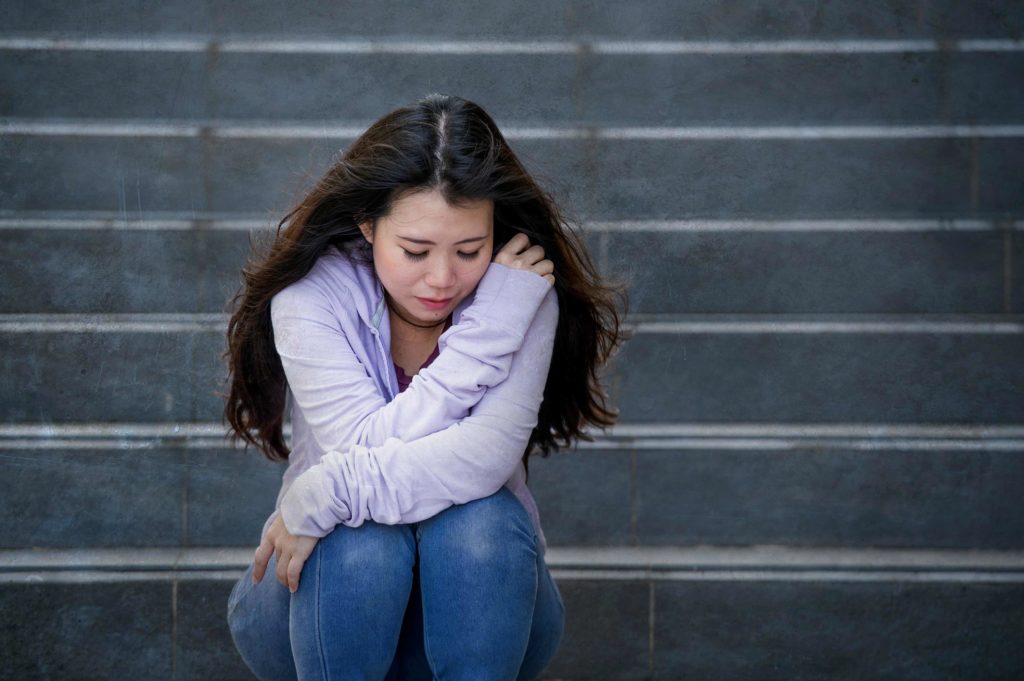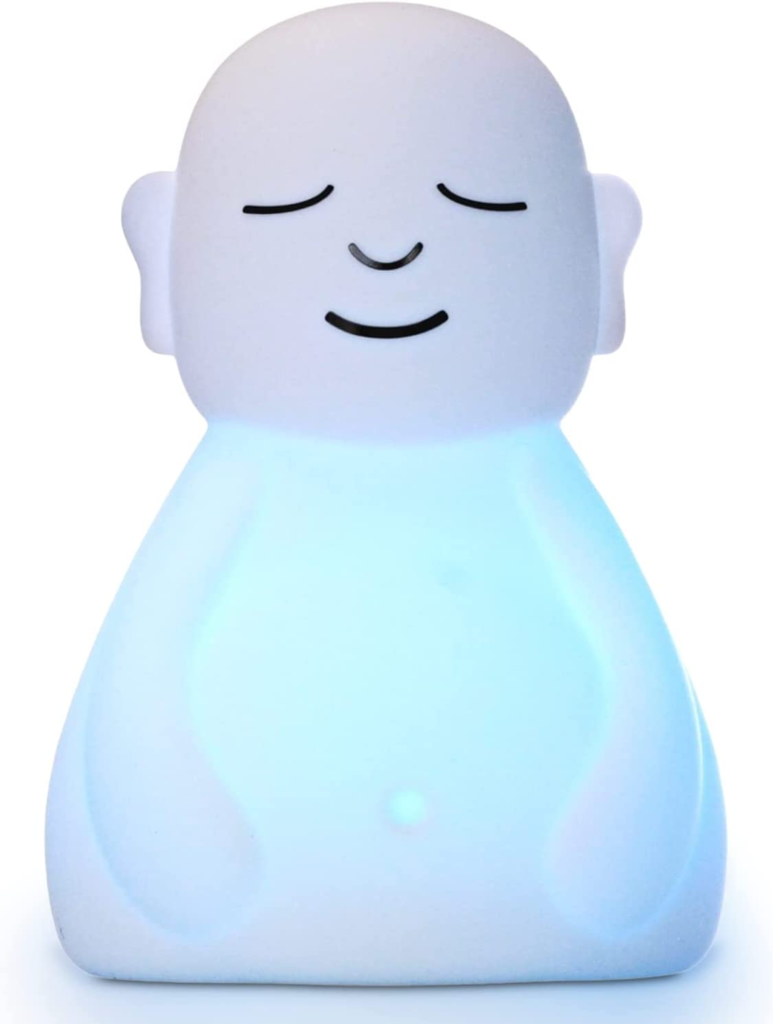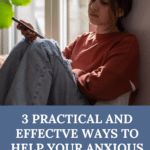
The first time I knew my daughter had anxiety was when I went to drop her off at a local fast-food restaurant to meet some girls from school.
She had been looking forward to it the day prior, but as the time inched closer, she started acting distracted, nervous, and tense. She kept fidgeting all morning, and was extremely irritated when I asked her if everything was alright.
When I pulled into the lot to drop her off, I parked the car in a spot off to the side instead of in front of the restaurant. “Do you not want to go in?” I asked.
Truth be told, I was a little frustrated. I re-arranged my plans so I could drive her, and she definitely changed the mood in our house that morning.
That’s when she blurted out, “I don’t want to go. I mean, I thought I did, but the truth is, I don’t even think we have much in common, and I think they only asked me because I was standing by them when they talked about it. I really don’t want to do this.”
My first mom instinct was to refute her argument. “Of course they want you to be there!” or, “I bet you’ll have fun once you get settled!” But I held my tongue.
The reality was my daughter had been exhibiting classic signs of anxiety for a few months now, and I did not want to push her over the edge. She seemed wary of many social situations, wasn’t sleeping well, and her moods were often erratic. We already made an appointment with a mental health professional, but her behavior exhibited all the tell-tale signs.
Instead of pushing her, I said, “Why don’t you text them that you have a headache? Just say thanks for the offer, and I’ll catch you next time.”
But I knew that I needed to do something more to help her, and I needed to do it right away.
Related: Why Your Teen May Have Anxiety
Anxiety in teens is at epidemic levels
According to a CDC report, a combined 20 million children between the ages of 3 and 17 were diagnosed with either ADHD, anxiety, depression or a behavioral disorder between 2016 and 2019. Anxiety accounts for 9.4% (approximately 5.8 million), and this number has only increased post-pandemic.
What is causing all this anxiety and stress? There are a number of contributing factors:
- Academic pressure and unrealistic expectations on achievement
- Social media and the pressure for perfection
- Inundation of bad news pushed through their screens
- Political strife and world events
- Constant worry about the safety of friends and family
- Increased level of trauma and unstable home environments
Related: How Guided Meditation Helped Me Grow Closer to My Energetic Tween Son
What are the signs of anxiety in a teenager?
It can be difficult to know the difference between normal teen angst and a mental health disorder. And we have to keep in mind that some anxiety and stress is normal and can even push us forward towards our goals.
If you have concerns, you should always contact your family doctor or a mental health professional, but here are some general anxiety symptoms to look out for in young people:
- Significant emotional changes or outbursts. Yes, it’s natural for all of us to have mood fluctuations, but if your teen seems suddenly irrational, short-tempered or has constant irritability, or can’t control themselves where it is impacting their relationships, this can be a sign of a larger problem.
- Decline in academic performance
- Physical symptoms, such as stomachaches, headaches, nausea, tense muscles, etc.
- Sleeping problems, such as extreme fatigue, insomnia, etc.
- Sudden panic attacks, which can include physical symptoms such as chest pains, increased heart rate, heavy breathing, dizziness, etc.
- Social changes, such as avoiding certain social situations, changing friend dynamics, or not taking part in activities they once enjoyed.
Three ways parents can help an anxious teen
If you think your teen is suffering from anxiety or another mental health condition or may be having suicidal thoughts, you should immediately contact a mental health professional.
If your tween or teen is facing some ongoing anxiety, there are things parents can do to help.
The most important is not to let them use their phone as their primary coping mechanism. Mindlessly scrolling or obsessively checking social media has been shown to increase the heart rate and anxiety levels.
Check out this post on teen cell phone addiction, and also consider this phone lockbox to encourage your family to go device-free during certain periods of the day, such as family meals, sleep time, or studying.
What can you do to replace phone time? Encourage your child to do one of these three things daily to help calm their anxiety. Even better if you can do them together.
4-7-8 guided breathing exercise
I was initially skeptical about this when my daughter’s therapist recommended it. It seemed too simple to have a real impact.
But guided breathing has helped not only my daughter with her anxiety but mine as well.
The 4-7-8 breathing method has been touted by many as almost a natural tranquilizer for the sympathetic nervous system—the system that makes us feel stress and anxiety as a defense mechanism.
The 4-7-8 breathing technique requires a person to focus on taking long, deep breaths in and out. To start, close your mouth and inhale quietly through your nose for four seconds. Hold your breath in for seven seconds. Exhale completely through the mouth, making a “whoosh” sound, for eight seconds.
Some people find it hard to focus on breathing, relaxing, and timing their breaths appropriately, especially teens who can be easily distracted. That’s why our therapist recommended the Breathing Buddha to help us with the process.

This cute little guy has two easy-to-use modes. The Buddha has fade-in, fade-out color prompts that simulate the 4/7/8 method: Green Buddha – Inhale , Purple Buddha – Hold, Blue Buddha – Exhale. The latest version also offers a 5/5 calming breath method for beginners or younger kids who may find the 4/7/8 method challenging.
My daughter uses the Breathing Buddha when she’s feeling stressed and anxious. It’s helped her on study breaks, and she often uses it after school when she feels tied up in knots.
As a middle-aged mom, I often use it before bed to unwind after a long day, and it’s definitely helped me fall asleep faster.
Mindfulness Apps
Research has shown that teens who consistently practice mindfulness experience lower rates of anxiety and depression. Mindfulness also leads to better sleep, stronger relationships, and increased self-awareness, which all benefit a teen’s overall health and happiness.
Being mindful is taking the time to be aware of your surroundings, body, emotions, actions, and thoughts. It can be as detailed as taking in the noises around you or slowing down and enjoying the peace and quiet.
Other ways to be mindful include:
- Slowing down when eating, thinking about how your food tastes and having your meals without distractions, such as TV, electronics, etc.
- Take three deep breaths several times during the day.
- Journal their feelings (many psychologists recommend teens journal regularly so they can better understand their emotions.) Moodtrack is an awesome app to help your teen track their moods and identify triggers that impact their behavior and self-esteem.
- Getting outside in nature
- Shower/take a bath (great opportunity to be alone with your thoughts)
During most of their days, our kids are often so busy rushing from one thing to the next that they completely forget to stop and think about how they’re doing at that moment. Additionally, adolescence is a time when teens rapidly develop emotionally, physically, and socially. This makes things like anxiety, mood swings, negative thoughts, low self esteem, and other issues more prevalent.
Mindfulness apps can help guide a tween or teen to stop for a few moments to collect their thoughts and emotions. Check out this post for more information and a few of our favorite mindfulness apps: Six Of The Best Mindfulness Apps For Teens To Help Them Manage Life
Encourage exercise
Sedentary behavior, mainly because of electronics, is a huge problem for today’s adolescents, and it is also a major contributor to the rising cases of teen anxiety.
Encouraging your teens to get moving can have a huge impact on their anxiety and stress levels, especially during challenging times (like during final exams, after a tough breakup, or before a big event.)
According to psychiatrist John J. Ratey in an article in Harvard Heatlh Publishing, exercise combats anxiety in the following ways:
- Engaging in exercise diverts you from the very thing you are anxious about.
- Moving your body decreases muscle tension, lowering the body’s contribution to feeling anxious.
- Getting your heart rate up changes brain chemistry, increasing the availability of important anti-anxiety neurochemicals, including serotonin, gamma aminobutyric acid (GABA), brain-derived neurotrophic factor (BDNF), and endocannabinoids.
- Exercise activates frontal regions of the brain responsible for executive function, which helps control the amygdala, our reacting system to real or imagined threats to our survival.
- Exercising regularly builds up resources that bolster resilience against stormy emotions.
Exercise causes neurochemicals to be released into the body. When we exercise, stress hormones like adrenaline and cortisol are reduced. As our stress hormones decrease, “happy hormones” like endorphins and serotonin increase.
Experts say how often we exercise is more important than how vigorously we exercise, so that means parents may need to gently push their teens towards physical activities.
If team sports or gym memberships aren’t an option, here are The Best Apps For Teens to Exercise At Home.
You can also encourage your tween or teen to get moving using the following suggestions:
- Make your teen the designated dog walker (or if you don’t have a pet, suggest this would be a great volunteer or job to help a neighbor)
- Enforce a no-electronics-before-exercise rule
- Center family time around a physical activity
- Model a commitment to exercising
- Make it fun. Let them pick out a new trail to hike or a new activity to try
- Tie exercise to other interests: If your teen likes art, spend the day walking around a museum. If they like to take Instagram-worthy photos, bike to some great spots. If video games are their passion, find some that encourage movement. Anything that active is good!
Parents can’t cure anxiety, but they can help their teens manage it
As a parent or caregiver, you play an essential role in helping your teen learn skills to reduce and contain anxiety and stress.
Most teens won’t thank you for pushing them towards these ideas, and they probably won’t be receptive to your efforts.
But keep trying. They are listening, and you never know when you will get that ‘yes.’
It won’t be easy, but they are certainly worth the effort!
When you are in the thick of raising teens and tweens, we recommend Loving Hard When They’re Hard to Love by Whitney Fleming. In Loving Hard When They’re Hard to Love, blogger Whitney Fleming shares her favorite essays about raising three teenagers in today’s chaotic world. Written from the perspective of a fellow parent, each story will leave you with tears in your eyes and hope in your heart because someone else is saying exactly what’s been going through your mind.

Raising teens and tweens is hard, but you don’t have to do it alone. Here are some other posts parents found helpful:
Comforting and Stress-Reducing Gifts to Help Your Anxious Teen
Five Empowering Things to Say to Your Anxious Teen
How Parents Can Know When to Seek Help for Their Anxious Teenager
The Best Way to Understand Your Teen’s Behavior Is to Start with Their Brain
*This post is sponsored by Mindsight Now and may contain affiliate links where we earn a small commission for purchases made from links in our post.







If you want to learn to create games and apps in Scratch, be sure to check our online scratch classes for children in the UK. We provide Level 1 and Level 2 courses in Scratch for children. Special discounts this summer for children joining before 15th June. Join UnicMinds Online Courses for Kids!